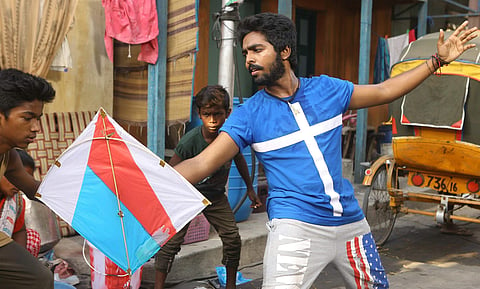

From a music director-turned-actor to an actor-composer, GV Prakash's rise as a hero is noteworthy. After Bala's Naachiyaar and Rajiv Menon's Sarvam Thala Mayam, the actor is now stepping into newer, more 'serious' zones. The idea, he says, is to explore as much as possible and learn every day. For instance, the energy of his character in Kuppathu Raja is what excited him about the project. This directorial debut of choreographer Baba Bhaskar also sees him experiment with dancing. "We have shot the introduction number with a lot of effort. Baba Bhaskar is a very sensible director," he says as we sit down to talk about his acting career, stepping back into the music world, and much more.
Excerpts from the conversation:
Within a few years of crossing over into acting, the kind of roles and the directors you have worked with are diverse. Why do you think so many directors approach you?
I think I look young on screen. Maybe directors cast me when they have young, boy-next-door characters, as the actors who were playing such films have now moved on to action and more.
You have played different versions of this particular character. How easy or tough is it to differentiate these from one another?
That comes from the directors and the mannerisms these characters have. For example, Kaathu in Naachiyaar had a different demeanour from Peter in Sarvam Thaala Mayam. My character in Kuppathu Raja, again, is very different.
Delays in film releases have quite become the norm these days. After facing several such roadblocks, do consider how relevant a film will be over a prolonged period while picking scripts?
We can't choose a film, it has to choose us. You get opportunities and you make your pick. It isn't possible to think too much while making such decisions. I base my decisions on instinct.
You are a successful music director and you have composed for your own films as well. How was it when you did the re-recording for your own film for the first time?
The first time was a tad peculiar -- to look at myself and score music. But I have always been a script-oriented composer and that made it easier. I try to understand what the scene needs and deliver as required. There are times when you elevate a scene with the music and times where you let it do the talking.
Did this 'script sensibility' that you have as a music director help when you began acting?
Even as a music director, I have gone with the flow. Thankfully, opportunities reached me. I am very open to trying out new things; I don't restrict myself much. I do avoid projects when they are really bad though. (laughs)
As an actor, what can you do when your film has sexist or misogynistic content?
We aren't the ones who write the script. If something is insane, you can tell them. But if they tell you, "This is the scene, do your job." What can one do? We can't do anything about it. Who writes the scene and the dialogues is very important.
Right now, I am part of several socially aware films. Ayngaran is about an unrecognised young scientist. Jail discusses the lives of the people who live in housing board colonies. It will be a very important film.
So we can say you have officially moved on to more 'serious' cinema?
You can say so. It is a step. But one can't just be part of serious cinema. I have to find a balance between commercial and offbeat cinema.
You're working with Vasanthabalan in Jail. After quite a gap, Dhanush has a sung a song for you. These are people you haven't worked with for a while...
I don't take many things to heart or carry it with me. I just take things as they come. But when I take on a job, I give my best to it.
You're also working with Vetrimaaran again on Asuran (as a composer). Can you tell us a bit about that project?
Asuran is an action thriller that covers three time periods -- 70s, 80s and the present. We have tried to incorporate the period differences in the music. The film's geography is also very intriguing, which the music will represent. The score will definitely be talked about.